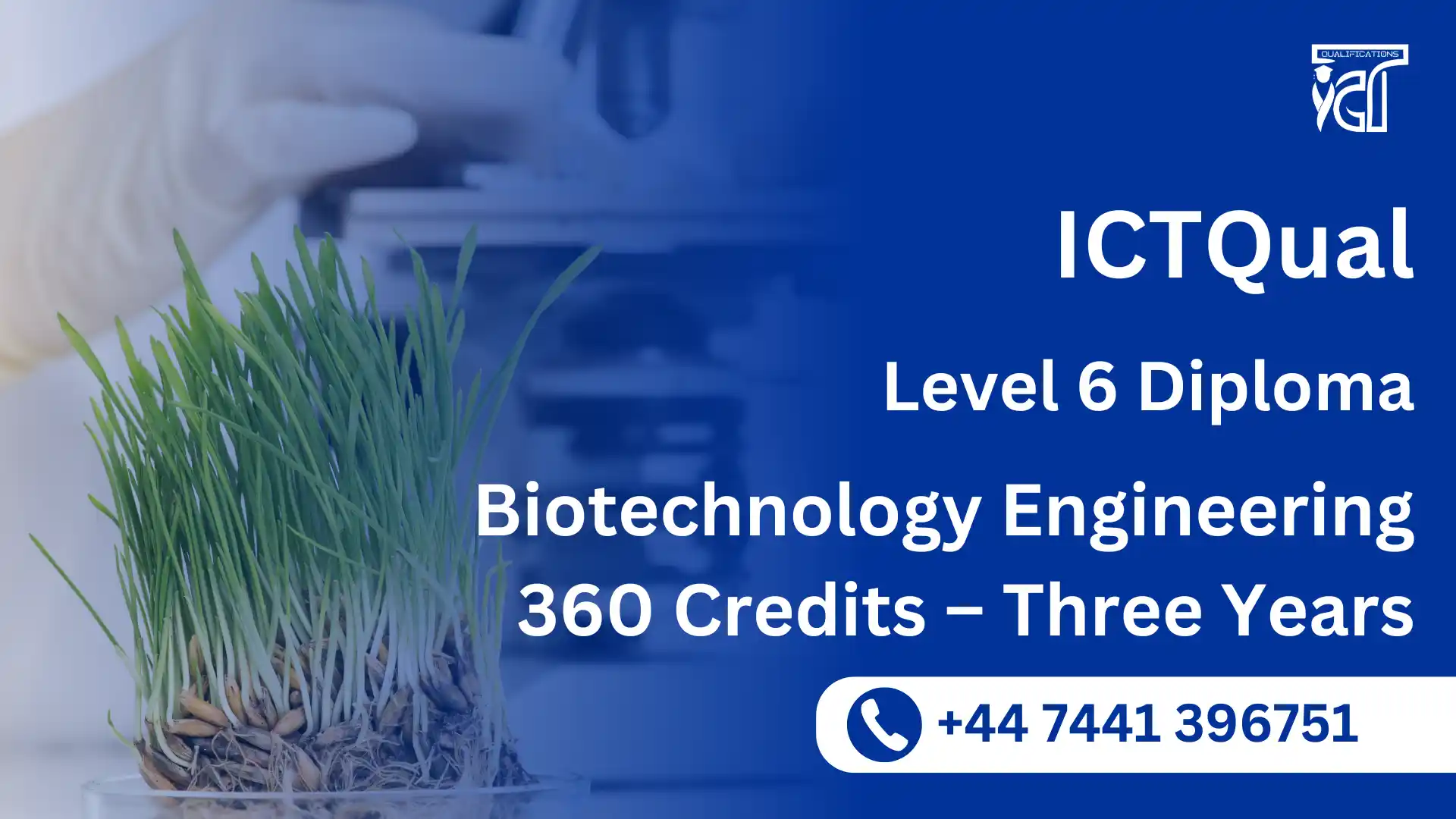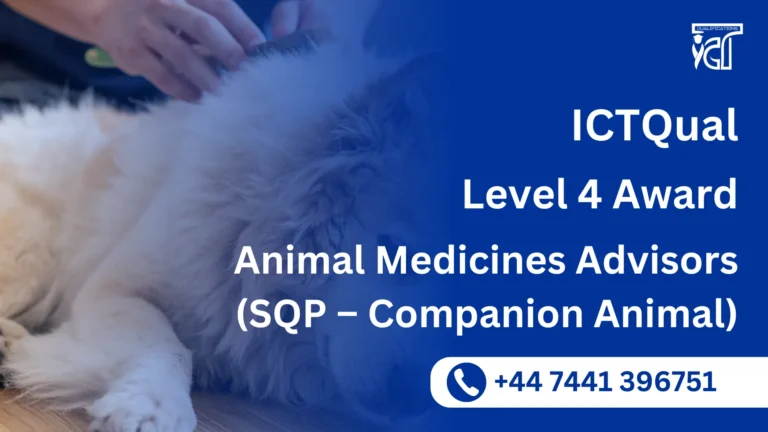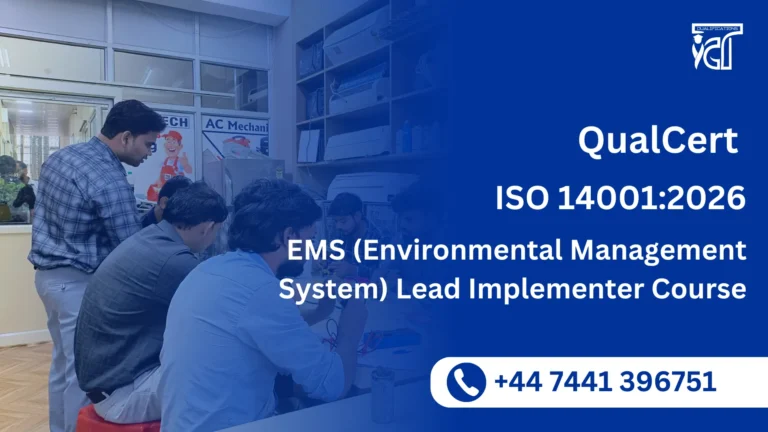The ICTQual Level 6 Diploma in Biotechnology Engineering 360 Credits – Three Years is a comprehensive programme designed to equip learners with advanced knowledge and practical skills in the rapidly evolving biotechnology sector. Whether you are a fresher aiming to build a strong foundation or an experienced professional seeking to expand your expertise, this diploma provides the tools needed to excel in research, development, and applied biotechnology industries.
Over a three-year period, learners complete a structured 360-credit curriculum that balances theoretical understanding with hands-on application. The programme covers essential areas such as molecular biology, genetic engineering, bioinformatics, bioprocessing, and biopharmaceutical technologies, enabling learners to develop the technical competencies required to meet modern industry standards.
Graduates of the ICTQual Level 6 Diploma in Biotechnology Engineering 360 Credits – Three Years gain a wide array of skills, including laboratory research techniques, experimental design, data analysis, and project management, preparing them for diverse career opportunities in biotechnology firms, research institutions, pharmaceutical companies, and healthcare innovation projects. Learners also acquire critical problem-solving abilities and analytical thinking, essential for addressing complex biological challenges and advancing technological solutions.
Key benefits of the ICTQual Level 6 Diploma in Biotechnology Engineering 360 Credits – Three Years include mastery of advanced biotechnological concepts, practical experience in laboratory and industrial settings, and readiness for leadership and specialist roles. Upon completion, learners emerge as highly skilled biotechnology professionals capable of contributing to cutting-edge research, sustainable biotechnology solutions, and the global bioengineering workforce.
The ICTQual Level 6 Diploma in Biotechnology Engineering 360 Credits – Three Years is ideal for ambitious learners who are passionate about biotechnology, genetic research, and applied engineering solutions, offering a clear pathway to career growth, professional recognition, and long-term success in an internationally relevant and rapidly growing industry.
ICTQual Level 6 Diploma in Biotechnology Engineering 360 Credits – Three Years
This qualification, the ICTQual Level 6 Diploma in Biotechnology Engineering 360 Credits – Three Years, consists of 36 mandatory units.
Year 1: Foundations of Biotechnology Engineering
- Introduction to Biotechnology
- Principles of Molecular Biology
- Basics of Biochemistry
- Fundamentals of Microbiology
- Introduction to Genetics and Genomics
- Principles of Cell Biology
- Mathematics for Biotechnology
- Fundamentals of Biostatistics
- Introduction to Engineering in Biotechnology
- Analytical Techniques in Biotechnology
- Basics of Bioinformatics
- Environmental Science and Sustainability
Year 2: Intermediate Biotechnology Concepts
- Bioprocess Engineering and Design
- Applied Microbiology and Industrial Applications
- Recombinant DNA Technology
- Biomaterials and Nanotechnology
- Immunology and Vaccine Development
- Protein Engineering and Enzyme Technology
- Bioinformatics Tools and Applications
- Environmental Biotechnology and Waste Management
- Bioreactors and Fermentation Technology
- Biomedical Engineering Basics
- Advanced Biostatistics and Data Analysis
- Ethical and Regulatory Aspects of Biotechnology
Year 3: Advanced Topics and Specialization
- Genetic Engineering and Genomic Editing
- Advanced Bioprocess Engineering
- Biotechnology Research Methods
- Pharmaceutical Biotechnology and Drug Development
- Systems Biology and Computational Modeling
- Agricultural Biotechnology and GMOs
- Industrial Biotechnology and Bioeconomy
- Synthetic Biology Applications
- Advanced Environmental Biotechnology
- Innovation and Entrepreneurship in Biotechnology
- Biotechnology Project Management
- Final Year Research Project
Learning Outcomes for the Level 6 Diploma in Biotechnology Engineering 360 Credits – Three Years:
Year 1: Foundations of Biotechnology Engineering
Introduction to Biotechnology
- Explain the scope, applications, and impact of biotechnology in various industries.
- Describe key concepts and terminologies in biotechnology.
Principles of Molecular Biology
- Understand the structure, function, and replication of DNA and RNA.
- Analyze molecular mechanisms of gene expression and regulation.
Basics of Biochemistry
- Identify the structure and function of biomolecules such as proteins, lipids, carbohydrates, and nucleic acids.
- Understand the principles of metabolic pathways and enzyme activity.
Fundamentals of Microbiology
- Describe microbial diversity, classification, and cellular structures.
- Apply basic microbiological techniques to culture and identify microorganisms.
Introduction to Genetics and Genomics
- Understand Mendelian inheritance and genetic variation.
- Explain genome organization and the role of genomics in modern biology.
Principles of Cell Biology
- Describe cell structure, function, and communication mechanisms.
- Analyze cell cycle processes and cellular responses to environmental stimuli.
Mathematics for Biotechnology
- Apply mathematical principles to solve problems in biotechnology.
- Use mathematical models for data interpretation in biological systems.
Fundamentals of Biostatistics
- Perform basic statistical analyses relevant to biotechnology research.
- Interpret experimental data using statistical tools and techniques.
Introduction to Engineering in Biotechnology
- Understand engineering principles applied in biotechnology processes.
- Explain the role of biotechnology in industrial applications.
Analytical Techniques in Biotechnology
- Demonstrate knowledge of spectroscopic, chromatographic, and imaging techniques.
- Apply these techniques to analyze biological samples.
Basics of Bioinformatics
- Use bioinformatics tools for DNA, RNA, and protein sequence analysis.
- Understand data mining and computational approaches in biotechnology.
Environmental Science and Sustainability
- Explain the role of biotechnology in environmental conservation.
- Understand sustainable practices for waste management and resource utilization.
Year 2: Intermediate Biotechnology Concepts
Bioprocess Engineering and Design
- Understand the principles of bioprocess development and scale-up.
- Design and optimize biotechnological processes for industrial applications.
Applied Microbiology and Industrial Applications
- Apply microbial biotechnology to industries such as food, pharmaceuticals, and agriculture.
- Analyze the role of microorganisms in biotechnological innovations.
Recombinant DNA Technology
- Perform basic techniques for DNA cloning, transformation, and expression.
- Understand the applications of recombinant DNA in research and industry.
Biomaterials and Nanotechnology
- Describe the properties and applications of biomaterials in biotechnology.
- Understand the role of nanotechnology in drug delivery and diagnostics.
Immunology and Vaccine Development
- Explain the components and functions of the immune system.
- Develop an understanding of vaccine production and immunotherapeutics.
Protein Engineering and Enzyme Technology
- Analyze protein structure-function relationships.
- Apply techniques to engineer enzymes for industrial applications.
Bioinformatics Tools and Applications
- Use advanced bioinformatics tools for genome annotation and functional analysis.
- Apply computational biology to solve biotechnological problems.
Environmental Biotechnology and Waste Management
- Understand biotechnological approaches to environmental restoration.
- Analyze strategies for bio-based waste recycling and pollution control.
Bioreactors and Fermentation Technology
- Explain the operation and design of bioreactors.
- Optimize fermentation processes for large-scale production.
Biomedical Engineering Basics
- Understand the integration of biotechnology and engineering in medical applications.
- Analyze the role of biomedical devices and technologies.
Advanced Biostatistics and Data Analysis
- Apply advanced statistical methods to analyze complex datasets.
- Interpret research findings using biostatistical software.
Ethical and Regulatory Aspects of Biotechnology
- Understand ethical considerations in biotechnology research and applications.
- Analyze global regulatory frameworks governing biotechnology practices.
Year 3: Advanced Topics and Specialization
Genetic Engineering and Genomic Editing
- Apply advanced techniques like CRISPR for genome editing.
- Understand ethical and societal implications of genetic engineering.
Advanced Bioprocess Engineering
- Design, optimize, and troubleshoot bioprocess systems.
- Analyze cost and efficiency aspects of industrial bioprocesses.
Biotechnology Research Methods
- Develop skills in experimental design and laboratory research.
- Conduct data collection and analysis for biotechnological research.
Pharmaceutical Biotechnology and Drug Development
- Understand the process of developing biopharmaceuticals.
- Analyze the role of biotechnology in personalized medicine.
Systems Biology and Computational Modeling
- Use computational models to study complex biological systems.
- Integrate omics data for systems-level understanding of biological networks.
Agricultural Biotechnology and GMOs
- Explain the principles of genetic modification in crops.
- Analyze the impact of agricultural biotechnology on food security.
Industrial Biotechnology and Bioeconomy
- Understand bio-based production of chemicals, fuels, and materials.
- Explore the economic and environmental impacts of industrial biotechnology.
Synthetic Biology Applications
- Design and construct synthetic biological systems.
- Analyze the applications of synthetic biology in diverse industries.
Advanced Environmental Biotechnology
- Apply advanced methods for bioremediation and sustainable development.
- Understand the role of biotechnology in mitigating climate change.
Innovation and Entrepreneurship in Biotechnology
- Develop entrepreneurial skills for biotechnology ventures.
- Analyze market trends and opportunities in the biotech industry.
Biotechnology Project Management
- Plan, execute, and manage biotechnology projects.
- Develop skills in budgeting, resource allocation, and team coordination.
Final Year Research Project
- Conduct independent research on a selected topic in biotechnology.
- Present findings in a professional report and defend them during evaluation.
The ICTQual Level 6 Diploma in Biotechnology Engineering equips learners with a comprehensive blend of theoretical knowledge, practical skills, and professional competencies required to excel in the biotechnology and life sciences sector. Beyond foundational concepts, learners gain hands-on experience, analytical skills, and industry-ready expertise, positioning them for diverse roles in research, healthcare, and bioengineering industries. The key benefits of the programme are summarised under five areas:
1. Advanced Biotechnology Knowledge
- In-depth understanding of molecular biology, genetic engineering, and bioprocessing
- Mastery of bioinformatics, biopharmaceutical technologies, and laboratory techniques
- Awareness of emerging trends and innovations in biotechnology
2. Practical Laboratory and Research Skills
- Hands-on experience in experimental design, laboratory research, and industrial processes
- Training in data analysis, quality control, and bioengineering applications
- Competence in using modern biotechnology tools and software
3. Career and Industry Opportunities
- Preparation for roles in biotechnology firms, pharmaceutical companies, research institutions, and healthcare innovation projects
- Eligibility for specialist positions such as Biotechnologist, Genetic Engineer, Laboratory Supervisor, or Bioinformatics Analyst
- Enhanced employability in local and global biotechnology markets
4. Professional Development and Leadership
- Development of problem-solving, critical thinking, and analytical skills
- Project management and teamwork capabilities for multidisciplinary biotechnology projects
- Familiarity with regulatory, ethical, and safety standards in biotechnology industries
5. Personal Growth and Long-Term Competitiveness
- Confidence in managing complex biological research and industrial projects
- Recognition as a skilled professional in a highly specialised and rapidly growing field
- Encouragement of lifelong learning and adaptability to evolving scientific and technological advancements
The ICTQual Level 6 Diploma in Biotechnology Engineering is designed for learners who are ambitious, curious, and eager to develop advanced skills in biotechnology and life sciences. This programme suits both freshers aiming to establish a strong foundation and experienced professionals seeking to formalise their expertise or advance their careers. The ideal learner can be categorised under five key areas:
1. Aspiring Biotechnology Professionals
- Fresh graduates or students seeking a structured pathway into biotechnology and genetic research
- Learners looking to develop a solid foundation in molecular biology, bioinformatics, and bioprocessing
- Individuals aiming to enter research laboratories, pharmaceutical firms, or healthcare innovation projects
2. Experienced Industry Practitioners
- Professionals with prior experience in biotechnology, life sciences, or laboratory work seeking formal recognition
- Learners looking to enhance technical knowledge, laboratory skills, and professional credibility
- Individuals preparing for senior or specialised roles in research, development, or bioengineering industries
3. Career-Oriented and Ambitious Individuals
- Learners motivated to advance into specialist or leadership roles in biotechnology and related fields
- Those interested in project management, consultancy, or innovation in the life sciences sector
- Individuals focused on long-term career growth and professional development
4. Analytical and Problem-Solving Thinkers
- Learners with strong critical thinking and data analysis skills
- Individuals interested in applying theoretical knowledge to practical research and industrial challenges
- Those who enjoy hands-on experiments, laboratory projects, and real-world biotechnology applications
5. Globally-Minded and Lifelong Learners
- Individuals seeking skills recognised internationally in biotechnology and bioengineering
- Learners who value continuous professional development and adaptability to emerging technologies
- Those looking to contribute effectively to local and global research, healthcare, and bioengineering initiatives
Upon completing the ICTQual Level 6 Diploma in Biotechnology Engineering, learners are equipped to advance their careers, pursue specialised roles, and contribute to innovative research and industrial applications in the biotechnology and life sciences sectors. The programme provides the knowledge, technical skills, and professional competencies necessary for diverse career pathways and higher education opportunities. Future progression can be categorised into five key areas:
1. Specialist Biotechnology Roles
- Advancement to positions such as Biotechnologist, Genetic Engineer, or Molecular Research Scientist
- Leadership in laboratory research, experimental design, and bioengineering projects
- Opportunities to manage specialised tasks in genetic modification, bioinformatics, or bioprocessing
2. Research and Laboratory Management
- Roles including Laboratory Supervisor, Research Coordinator, or Quality Control Manager
- Oversight of laboratory operations, compliance with safety regulations, and project workflow management
- Management of research experiments, data collection, and analytical reporting
3. Pharmaceutical and Biopharmaceutical Careers
- Employment in pharmaceutical companies, biopharmaceutical production, and healthcare innovation projects
- Positions such as Clinical Research Associate, Bioinformatics Analyst, or Process Development Scientist
- Contribution to product development, clinical trials, and industrial-scale bioprocessing
4. Further Academic and Professional Qualifications
- Eligibility for postgraduate studies, professional diplomas, or research-based degrees
- Access to advanced certifications in biotechnology, bioengineering, or molecular sciences
- Lifelong learning and upskilling opportunities to stay at the forefront of scientific and technological developments
5. International and Global Opportunities
- Career options with multinational biotech companies, research institutions, or healthcare organisations
- Opportunities to work on international biotechnology projects, sustainable bioengineering initiatives, and genetic research innovations
- Recognition as a competent professional in global biotechnology and life sciences markets
As an approved centre of ICTQual AB, we offer learners two structured pathways to achieve the Level 6 Diploma in Biotechnology Engineering:
1. Experienced Professionals Route
- Designed for learners with a minimum of 6 years of verifiable experience in biotechnology, life sciences, or related laboratory work.
- Learners can leverage their prior industry experience to gain recognition without completing all assignments.
- This route is ideal for professionals seeking formal qualification to validate their expertise and advance their careers.
2. Fresh Candidate Route
- Tailored for learners with little or no prior experience in biotechnology.
- Fresh candidates are required to complete 36 assignments to demonstrate competency across all course modules.
- This structured pathway ensures learners gain a thorough understanding of biotechnological concepts, practical skills, and industry standards.
All learners must enrol with our approved ICTQual AB centre to access study materials, complete assignments, and receive professional support throughout the three-year, 360-credit programme. These certification routes are designed to accommodate both freshers and experienced professionals, ensuring every learner achieves a globally recognised qualification in biotechnology engineering.
Entry Requirements
The ICTQual Level 6 Diploma in Biotechnology Engineering is designed to ensure learners are adequately prepared for the programme while remaining accessible to both fresh candidates and experienced professionals. The entry requirements are as follows:
1. Minimum Age
- Learners must be 18 years or older at the time of enrolment.
- Mature learners with relevant experience are encouraged to apply, particularly through the experienced professional route.
2. Educational Background
- Ideally, learners should hold a Level 5 or equivalent qualification in biotechnology, life sciences, or a related discipline.
- Fresh candidates without prior formal qualifications are welcome through the structured assignment route, ensuring comprehensive learning from foundational to advanced biotechnology topics.
3. Professional Experience
- For the Experienced Professionals Route, learners must have at least 6 years of verifiable work experience in biotechnology, laboratory research, or related life sciences fields.
- Fresh candidates without prior experience will complete 36 assignments to demonstrate competency across all modules.
4. Language Proficiency
- Learners must have a good command of English, both written and spoken, to effectively understand course materials, complete assignments, and communicate in professional contexts.
- IELTS 5.5 or equivalent is recommended for international learners, though exceptions may be considered on a case-by-case basis.
Register Now
Qualification Process
Qualification Process for the ICTQual Level 6 Diploma in Biotechnology Engineering 360 Credits – Three Years
- Self-Assessment:
Begin by evaluating your eligibility to ensure you meet the qualification requirements, including work experience, knowledge, and language proficiency. - Registration:
Complete your registration by submitting the required documents, including a scanned copy of a valid ID, and paying the registration fee. - Induction:
An assessor will conduct an induction to confirm your eligibility for the course and explain the evidence requirements. If you do not meet the criteria, your registration will be cancelled, and the fee will be refunded. - Assignments & Evidence Submission:
Provide all assignments and the necessary evidence based on the assessment criteria outlined in the course. If you are unsure of the required evidence, consult with the assessor for guidance on the type and nature of evidence needed. - Feedback and Revision:
The assessor will review your submitted evidence and provide feedback. Evidence that meets the criteria will be marked as “Criteria Met,” while any gaps will be identified. You will be asked to revise and resubmit if needed. - Competence Evidence:
Submit final evidence demonstrating that all learning outcomes have been met. This evidence will be marked as “Criteria Met” by the assessor once it is satisfactory. - Internal Quality Assurance (IQA):
The Internal Quality Assurance Verifier (IQA) will review your evidence to ensure consistency, quality, and compliance with standards. - External Verification:
The IQA will submit your portfolio to ICTQUAL AB External Quality Assurance Verifiers (EQA) for final confirmation. The EQA may contact you directly to verify the authenticity of your evidence. - Certification:
Upon successful completion of all checks, ICTQUAL AB will issue your official certificate, confirming that you have attained the ICTQual Level 6 Diploma in Civil Engineering 360 Credits – Three Years.







